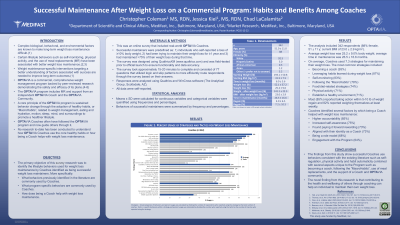Back

Objectives: An online survey including real-world OPTAVIA® Coaches was conducted to understand the habits of successful weight loss maintainers. OPTAVIA (the “Program”) is a holistic commercial weight management program that includes meal replacements and support from the OPTAVIA Community and a Coach to promote a healthy lifestyle via a core set of healthy habits related to weight management, eating and hydration, motion, sleep, mind, and surroundings. Coaches often have followed the Program and now guide others through it. However, it is not known how Coaches use the habits or how being a Coach helps with weight loss maintenance. Therefore, this study identified the behaviors used by Coaches (n=342) who were considered successful at weight loss maintenance.
Methods: Coaches who lost ≥10% body weight on the Program, had been trying to maintain their weight loss for ≥1 year, and had maintained >75% of their weight loss during that time were included in the analysis. Mean±SD were calculated for continuous variables and categorical variables were quantified using frequencies and percents. All data were self-reported.
Results: Coaches (88% female, 51±11 y) lost 25.2±9.0% body weight and were in maintenance 26.5±16.6 months. On average, Coaches used 7.3 strategies for maintaining their weight loss. The most common strategies included: becoming a Coach (93%), using habits learned during weight loss (87%), self-monitoring (83%), using the core healthy habits (78%), food/diet-related strategies (74%), exercise (71%), creating a healthy environment (71%), behavioral/emotional strategies (70%) and seeking support (59%). Most (85%) reported taking action within 5-10 lb of weight regain, and 82% reported weighing themselves at least weekly. Coaches identified several factors by which being a Coach helped with weight loss maintenance: higher accountability (85%), increased self-awareness (75%), finding paying it forward rewarding (73%), aligning with their identity as a Coach (73%), being a role model (68%), and engagement with the Program (64%).
Conclusions: Successful Coaches used behaviors consistent with the scientific literature combined with several others unique to the Program, such as those centered on the Program’s core healthy habits. They also identified several factors related to being a Coach that were beneficial to their success.
Funding Sources: Medifast, Inc.
Obesity
(PO25-12-22) Successful Maintenance After Weight Loss on a Commercial Program: Habits and Benefits Among Coaches


Christopher Coleman, MS, RDN
– Principal Scientist, Medifast, Inc., Baltimore, Maryland, United States- JK
Jessica Kiel, MS, RDN
– Clinical Research Manager, Medifast, Inc., Baltimore, Maryland, United States - CL
Chad LaCalamita
– Medifast, Inc.
Presenting Author(s)
Co-Author(s)
Disclosure(s):
Christopher Coleman, MS, RDN: Medifast, Inc.: Employee (Ongoing)
Jessica Kiel, MS, RDN: Medifast, Inc.: Employee (Ongoing)
Objectives: An online survey including real-world OPTAVIA® Coaches was conducted to understand the habits of successful weight loss maintainers. OPTAVIA (the “Program”) is a holistic commercial weight management program that includes meal replacements and support from the OPTAVIA Community and a Coach to promote a healthy lifestyle via a core set of healthy habits related to weight management, eating and hydration, motion, sleep, mind, and surroundings. Coaches often have followed the Program and now guide others through it. However, it is not known how Coaches use the habits or how being a Coach helps with weight loss maintenance. Therefore, this study identified the behaviors used by Coaches (n=342) who were considered successful at weight loss maintenance.
Methods: Coaches who lost ≥10% body weight on the Program, had been trying to maintain their weight loss for ≥1 year, and had maintained >75% of their weight loss during that time were included in the analysis. Mean±SD were calculated for continuous variables and categorical variables were quantified using frequencies and percents. All data were self-reported.
Results: Coaches (88% female, 51±11 y) lost 25.2±9.0% body weight and were in maintenance 26.5±16.6 months. On average, Coaches used 7.3 strategies for maintaining their weight loss. The most common strategies included: becoming a Coach (93%), using habits learned during weight loss (87%), self-monitoring (83%), using the core healthy habits (78%), food/diet-related strategies (74%), exercise (71%), creating a healthy environment (71%), behavioral/emotional strategies (70%) and seeking support (59%). Most (85%) reported taking action within 5-10 lb of weight regain, and 82% reported weighing themselves at least weekly. Coaches identified several factors by which being a Coach helped with weight loss maintenance: higher accountability (85%), increased self-awareness (75%), finding paying it forward rewarding (73%), aligning with their identity as a Coach (73%), being a role model (68%), and engagement with the Program (64%).
Conclusions: Successful Coaches used behaviors consistent with the scientific literature combined with several others unique to the Program, such as those centered on the Program’s core healthy habits. They also identified several factors related to being a Coach that were beneficial to their success.
Funding Sources: Medifast, Inc.

.png)
